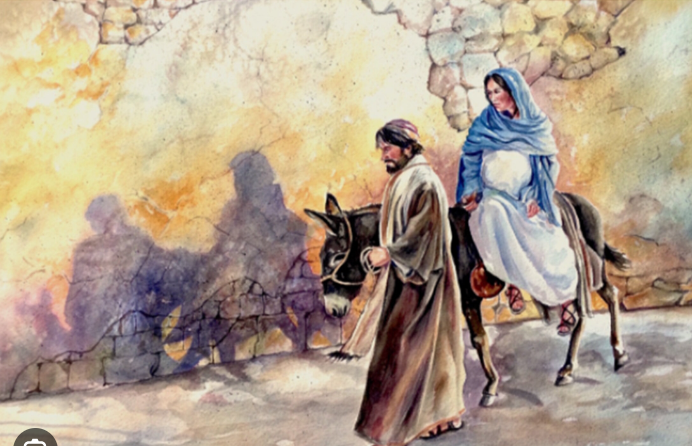THE MYSTERY OF CHRISTMAS – Mary and Joseph’s Journey to Bethlehem
Joseph and Mary’s journey to Bethlehem is prophetic, even if it is actually caused by the edict of Emperor Caesar Augustus who wanted to make a census of the empire. Like the others, Joseph also found himself forced to return to the place where his family came from, Bethlehem.
In those days a decree went out from Caesar Augustus that all the inhabited world should be registered. (This was the first registration, when Quirinius was governor of Syria.) And all went to be registered, each to his own city. Joseph also went up from Galilee, from the city of Nazareth, to Judea, to the city of David, which is called Bethlehem, because he was of the house and lineage of David, to be registered along with Mary, his betrothed, who was with child. And while they were there, the days came for her to be delivered. And she gave birth to her firstborn son and wrapped him in swaddling clothes, and laid him in a manger, because there was no place for them in the inn . (Lk 2:1-6)
In the Annunciation, speaking of the Child who would be born of Mary, the angel Gabriel said humanly incredible things: “The Lord God will give him the throne of his father David and he will reign over the house of Jacob forever and of his kingdom there will be no end”. This prophecy is revealed, then, in the journey to Bethlehem. Mary and Joseph make this journey in faith, in the understanding of the mysteries of God who speaks to us through the events of History and through the events of our lives. We must, then, read the events of our personal life and of the world precisely in the light of faith because in the end it is God the Lord and his Providence guides everything.
Mary and Joseph, on this journey, are aware that they are fulfilling the prophecy revealed by the archangel Gabriel according to which the Lord God would ensure that the Child would receive the throne of his father David. Mary and Joseph wonder what the meaning of this prophecy would be because, looking at reality, they are making a journey on the back of a humble donkey in the very days in which the Child should have been born. The journey from Nazareth to Bethlehem is long and tiring, especially with the few means available to a family like theirs, composed of a carpenter and a housewife.
In the light of this extraordinary prophecy that speaks of royalty and a kingdom that will never end, Mary and Joseph face this tiring, humble and poor journey. It is true that God’s thoughts are not our thoughts, just as his ways are not ours. Humanly it is tiring to understand God’s thoughts, we must therefore leave our earthly mentality, raise our gaze and transcend ourselves to get closer to God’s way of thinking by entrusting ourselves to His divine Providence. Faced with the angel’s prophecy, Mary and Joseph faced the long journey with humility and total trust in God’s plan, aware that it would come true. God always carries out his plans through humility, walking the way of the Cross.
Saint John Paul II developed a wonderful concept: Our Lady, who is also blessed because she believed in the fulfillment of the Word of the Lord, progressed in faith, and made her own journey. In fact, we read in the Encyclical Redemptoris Mater :
Mary’s faith can therefore also be compared to that of Abraham, whom the Apostle calls “our father in faith” ( Rom 4:12). In the salvific economy of divine revelation, Abraham’s faith constitutes the beginning of the Old Covenant; Mary’s faith at the Annunciation begins the New Covenant. Just as Abraham “hoped against hope and believed that he would become the father of many nations” ( Rom 4:18), so Mary, at the moment of the Annunciation, after indicating her virginal condition (“How can this be, since I do not know a man”), believed that by the power of the Most High, through the work of the Holy Spirit, she would become the Mother of the Son of God according to the angel’s revelation: “Therefore the child to be born will be called holy, the Son of God” ( Lk 1:35). However, Elizabeth’s words: “And blessed is she who believed” do not apply only to that particular moment of the Annunciation. Certainly this represents the culminating moment of Mary’s faith in waiting for Christ, but it is also the starting point from which her entire “journey towards God” begins, her entire journey of faith. And on this path, in an eminent and truly heroic way – indeed with an ever greater heroism of faith – the “obedience” she professed to the word of divine revelation will be implemented. And this “obedience of faith” on Mary’s part throughout her journey will have surprising analogies with the faith of Abraham. Like the patriarch of the people of God, so too Mary, along the path of her filial and maternal fiat, “had faith hoping against all hope”. Especially along some stages of this path the blessing granted to “she who believed” will be revealed with particular clarity. To believe means to “abandon oneself” to the very truth of the word of the living God, knowing and humbly recognizing “how inscrutable are his judgments and how inscrutable his ways” ( Rom 11:33). Mary, who by the eternal will of the Most High found herself, one might say, at the very center of those “inscrutable ways” and those “inscrutable judgments” of God, conforms to them in the shadow of faith, accepting fully and with an open heart all that is disposed in the divine plan.
In the Annunciation there is no trace of the Cross, there is an indication of the greatness of that Child whose kingdom will be eternal, but there is no mention of the Cross whose revelation will take place through the mouth of Simeon. Divine pedagogy is revealed through the Holy Spirit, precisely in the journey from Nazareth to Bethlehem on the back of a donkey and not a royal camel. When they finally arrive in Bethlehem, Mary and Joseph find no lodging; no one wants to welcome a humble couple who are about to give birth to a child. They experience, then, the reality of the greatness of God who works in human History steeped in sin, rejection, hostility to God.
Mary and Joseph understand the pedagogy of God who carries out his plans in humility, in concealment, in toil, in persecution, in struggle, in refusal. At the moment in which the Child must be born, Mary and Joseph are in a cave, which shepherds used in winter as a shelter for animals. Here is the manifestation of God’s pedagogy, in the humility of that cave, warmed by the breath of a donkey and an ox, the Son of God, the Savior and Redeemer of the world, is born. The Holy Spirit allows Mary and Joseph to understand this great teaching: despite the refusal to welcome them, despite the inhospitable and humble place, despite the fatigue of the long journey, Jesus is born and an angel announces to the shepherds: “Do not be afraid, for behold, I bring you good news of great joy, which will be for all the people: today in the city of David a Savior is born to you, who is Christ the Lord. And this will be a sign for you: you will find a baby wrapped in swaddling clothes and lying in a manger”.
On that journey Mary and Joseph understood that we must raise our thoughts to the thoughts of God, adapt ourselves in humility, take up the Cross and carry it. From Nazareth to Bethlehem Mary and Joseph became aware that, even if God’s plans do not correspond to ours, we must entrust ourselves completely to Him. Mary and Joseph understood the task that God had entrusted to them, one to be the Mother of the Word, the other the guardian of the Child that the Madonna would give birth to. While they were assimilating the greatness of their vocation, Mary and Joseph experienced the way through which God realizes his plans and the vocations of those he himself chooses to realize them, that is, the way of humility, of concealment, of the Cross, of suffering, of faithfulness. Following this path Mary and Joseph reach the heights of their journey of faith. We too must walk the path of life in the humility of total entrustment to God; in the light of God we are all important, unique.
God realizes his plans through his own pedagogy, which Mary, Joseph and especially Jesus experienced. It is difficult to understand God’s plans and, above all, to accept them in the way in which He realizes them, but following the example of Mary and Joseph, we too can set out on a journey and grow humbly in faith, step by step.


